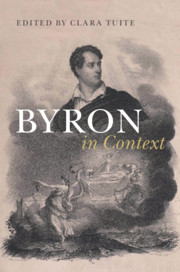Book contents
- Byron in Context
- Byron in Context
- Copyright page
- Dedication
- Contents
- Illustrations
- Contributors
- Chronology
- Abbreviations and Note on the Text
- Introduction
- Part I Life and Works
- Part II Political, Social and Intellectual Transformations
- Part III Literary Cultures
- Part IV Reception and Afterlives
- Chapter 31 Contemporary Critical Reception to 1824
- Chapter 32 Byron, Radicals and Reformers
- Chapter 33 European Reception
- Chapter 34 Recollections, Conversations and Biographies
- Chapter 35 Posthumous Reception and Reinvention to 1900
- Chapter 36 Popular Culture
- Chapter 37 Byron Now
- Further Reading
- Index
Chapter 31 - Contemporary Critical Reception to 1824
from Part IV - Reception and Afterlives
Published online by Cambridge University Press: 04 October 2019
- Byron in Context
- Byron in Context
- Copyright page
- Dedication
- Contents
- Illustrations
- Contributors
- Chronology
- Abbreviations and Note on the Text
- Introduction
- Part I Life and Works
- Part II Political, Social and Intellectual Transformations
- Part III Literary Cultures
- Part IV Reception and Afterlives
- Chapter 31 Contemporary Critical Reception to 1824
- Chapter 32 Byron, Radicals and Reformers
- Chapter 33 European Reception
- Chapter 34 Recollections, Conversations and Biographies
- Chapter 35 Posthumous Reception and Reinvention to 1900
- Chapter 36 Popular Culture
- Chapter 37 Byron Now
- Further Reading
- Index
Summary
“As an author, I am cut to atoms by the E[dinburgh] Review,” Byron wrote to John Cam Hobhouse a month after his twentieth birthday, “it is just out, and has completely demolished my little fabric of fame, this is rather scurvy treatment from a Whig Review, but politics and poetry are different things, & I am no adept in either, I therefore submit in Silence” (BLJ 1: 158–9). The savage attack on Hours of Idleness in the Edinburgh Review of January 1808, subjecting Byron to a rite of passage reserved by Romantic periodicals for select authors, was a defining moment in the young poet’s career. If the author of Childe Harold’s Pilgrimage would awake in 1812 to find himself famous, it was only after the author of Hours of Idleness had awoken one day early in 1808 to find himself humiliated. A harsh review of his first public poetic venture (Fugitive Pieces and Poems on Various Occasions had both been privately published), appearing in the leading periodical of the day and written (Byron assumed) by its editor, Francis Jeffrey, the man who for many of his contemporaries was or would become the leading critic of the day – all this clearly mattered to the young poet. As did the fact that the Edinburgh had recently “come out” as an unequivocally Whig review.
- Type
- Chapter
- Information
- Byron in Context , pp. 257 - 264Publisher: Cambridge University PressPrint publication year: 2019



